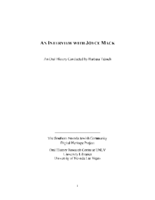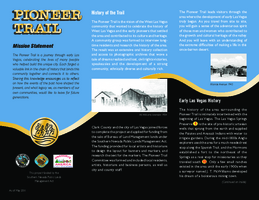Search the Special Collections and Archives Portal
Search Results

Transcript of interview with Joyce Mack by Barbara Tabach, February 23, 2015
Date
Archival Collection
Description
In this interview, Joyce Mack discusses meeting her husband, Jerry Mack, in Los Angeles,their early life as a couple, and moving to Las Vegas at the suggestion of Jerry's father, Nate Mack. She discusses how Jerry met Parry Thomas and their banking and real estate investments. Mrs. Mack talks about the opening of the Thomas and Mack Center at UNLV, and the development of the strip hotels, and discusses her children.
Joyce Mack: wife to Jerry Mack and matriarch of one of the most influential families of Las Vegas history. During this oral history conversation, she begins by tracing her family ancestry from Kiev to New York to Omaha and then Los Angeles, where she was born and raised. At a UCLA fraternity party in the early 1940s, a teenage Joyce Rosenberg was swept off her feet by her older brother's friend Jerry Mack. Jerry was from Boulder City, Nevada and had attended school in Las Vegas. In 1946, the couple married and took an extended honeymoon throughout the United States and Cuba. Soon afterwards, Jerry's father Nate Mack, a businessman and real estate developer encouraged the newlyweds to come to Las Vegas. She tells of Jerry sharing his vision of the valley's future. Thus began a successful journey that traverses decades of Las Vegas history and breathtaking growth in which the Macks were active participants and leaders. Joyce recalls the people the first met, who they raised their children side-by-side with and became lasting friends. These people were other Las Vegas pioneers including the Greenspuns and mostly importantly her husband's partnership with Parry Thomas which created the Bank of Las Vegas. It was their partnership she explains that reduced the presence of the mob element. As members of the small Jewish community of the late 1940s, the Macks would participate in the founding of Temple Beth Sholom.
Text

Brochure, Pioneer Trail of West Las Vegas community
Date
Archival Collection
Description
Brochure highlights and maps historic points of interest in West Las Vegas.
Text
Franklin M. Murphy Geological Papers
Identifier
Abstract
The Franklin M. Murphy Geological Papers (1919-1956) contain surveys, lectures, reports, correspondence, newspaper clippings, bulletins, maps, and dam site investigations from six different states in the American west. Also included are mining projects, photographs, scrapbooks, albums, school papers, and Murphy's thesis.
Archival Collection
LGBTQ Las Vegas Records
Identifier
Abstract
The
Archival Collection
Las Vegas Rotary Club Records
Identifier
Abstract
The Las Vegas Rotary Club Records (1981-2022) contain award certificates, club directories and rosters, Las Vegas Rotary publications, commemorative material including a 20-foot by 34-foot velvet curtain. The collection also contains plastic and metal Rotary Club signs from across the United States and international locations, material from a Rotary Club in Africa, and a digital video segment made in 2013 about the history of the Las Vegas Rotary.
Archival Collection
Basic Magnesium, Inc.
Basic Magnesium, Inc. (BMI) formed in June 1941 as a joint venture between Basic Refractories, Inc. of Cleveland, Ohio and Magnesium Elektron, Limited of England. Basic Refractories, Inc. owned mining claims in Gabbs Valley, Nye County, Nevada, which produced the magnesite and brucite needed to produce magnesium metal. Magnesium Elektron, Limited owned the patent for the electrolytic process of extracting metallic magnesium from these minerals.
Corporate Body

Laura Gentry interview, February 26, 1977: transcript
Date
Archival Collection
Description
On February 26, 1977, collector Harold May interviewed Laura Gentry (born May 1897 in St. Thomas, Nevada) at her cabin in Gold Butte, Nevada. In this interview, Laura Gentry discusses living in St. Thomas and Overton, Nevada. She discusses the development of the Overton and Gold Butte areas of Nevada as well as the people involved in mining in these areas.
Text

Transcript of interview with Ron Lawrence by Dennis McBride, June, July and August 1997
Date
Archival Collection
Description
Ron Lawrence is one of the busiest people in the gay community, so I want him to know how much I appreciate his reserving time for me so that I could complete this oral history interview. The importance of his work toward the well-being of the gay community in Las Vegas cannot be measured, and much of what he's accomplished and otherwise made possible will live long after he leaves us. With Ron's consent to this interview, our knowledge of Nevada's gay history is greatly enriched and our record preserved.
Text

